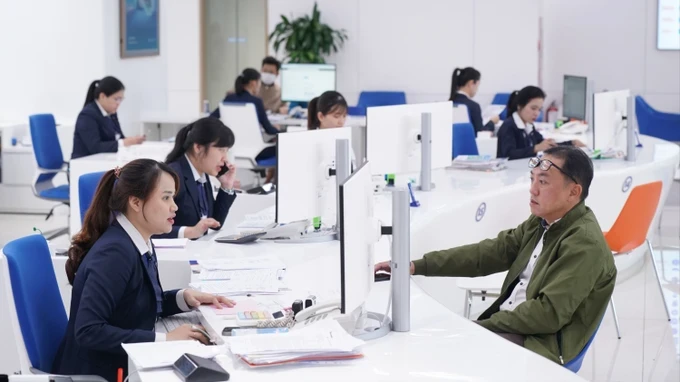Biometric authentication hiccups mar first day of new banking regulations
Society – Economy - Ngày đăng : 08:32, 02/07/2024

According to Decision No.2345/QD-NHNN by the State Bank of Vietnam on December 18, 2023, effective as of July 1, 2024, only bank payment accounts with successful biometric authentication can be used for domestic online transfers or e-wallet top-ups exceeding VND10 million (US$393) per transaction, VND20 million ($786) per day; international money transfers or payment for goods and services with a total transaction value of over VND100 million ($3,930) per day.
At the transaction point of Shinhan Bank – An Dong Branch on An Duong Vuong Street of District 5 in HCMC, despite nearing the end of the afternoon workday, over a dozen customers were still waiting for their turn.
Similar scenes were observed at Techcombank on Nguyen Thi Minh Khai Street and Agribank on Mac Thi Buoi Street of District 1 (HCMC). At around 4:30 p.m. yesterday, many Vietcombank customers reported being unable to access the VCB Digibank app to conduct transactions. Vietcombank acknowledged that due to the high volume of customers accessing the system on the first day of biometric authentication implementation, there were some disruptions.
Preliminary statistics from the 24/7 call centers of several banks also showed a significant increase in workload in recent days. Many of them have been about support for updating biometric information.
Some technology experts explained that the location of the NFC (Near Field Communication) reader on the latest iOS phones is usually on the back, near the rear camera. The location of the NFC reader on Android phones can vary depending on the manufacturer and model, but it is often located on the back of the phone. However, some Android phones have the NFC reader placed under the battery (covered by the back cover); or some others place the NFC reader next to the charging port.
These locations make it difficult for the smartphone to read data on a citizen ID card during the process of updating biometric information as instructed by bank apps. Other customers encountered problems related to the chip on their ID cards, which may be dirty or damaged.

Despite the initial hiccups, some banks have reported successful implementations. CEO Nguyen Hung of TPBank stated that over 500,000 customers of his bank have updated their chip-based ID cards and verified their facial biometrics to comply with the new regulations.
Of these, 80 percent of customers did the update themselves on the TPBank Mobile app, while only 20 percent did it through transactions or LiveBank 24/7. Since TPBank had already implemented facial recognition for transfers over VND10 million per transaction and VND20 million per day on June 20, there were not many customers who came to the bank on the first day to seek authentication assistance.
Director Tran Thai Binh of Sacombank’s Digital Banking Division informed that the bank had created videos and infographics to guide customers on how to set up facial biometric information on its website, Facebook, YouTube, TikTok, Zalo, so many customers had proactively registered on the bank's Sacombank Pay app following the instructions quite quickly and smoothly.
According to the State Bank of Vietnam, on July 1, the proportion of transactions over VND10 million per transaction was 8.35 percent of the total transaction volume. Statistics from credit institutions up to 4:00 p.m. also showed no congestion in transactions over VND10 million when using facial biometric authentication.
